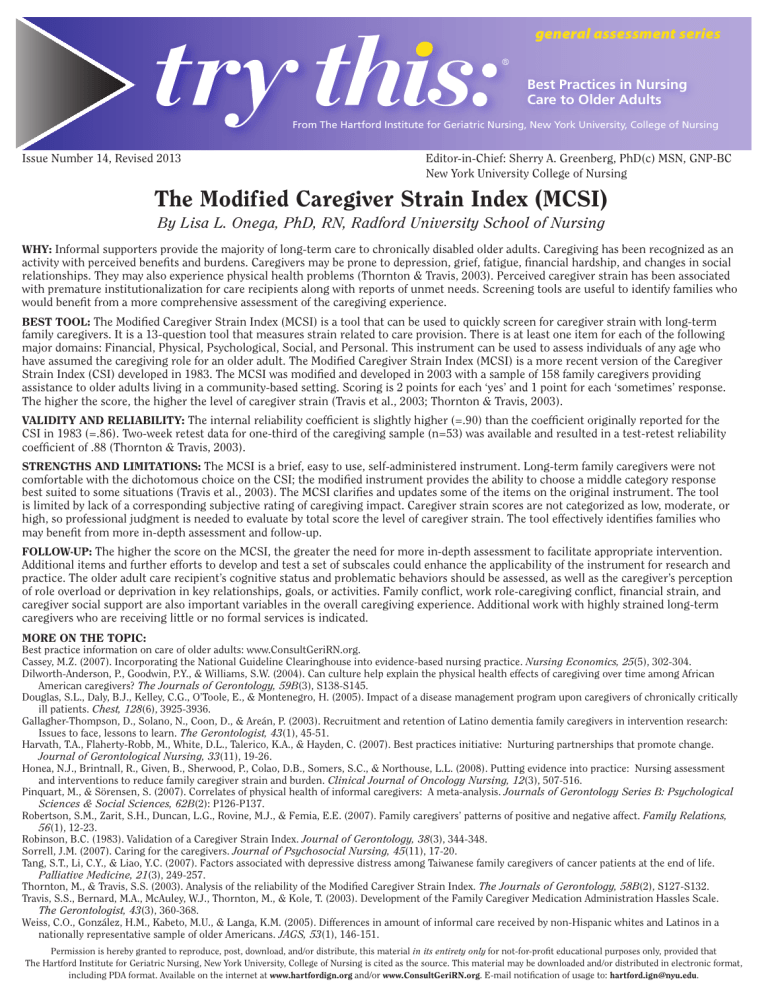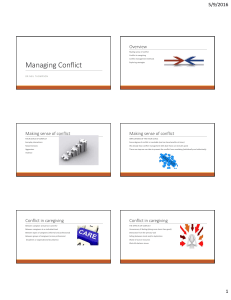
general assessment series Best Practices in Nursing Care to Older Adults From The Hartford Institute for Geriatric Nursing, New York University, College of Nursing Issue Number 14, Revised 2013 Editor-in-Chief: Sherry A. Greenberg, PhD(c) MSN, GNP-BC New York University College of Nursing The Modified Caregiver Strain Index (MCSI) By Lisa L. Onega, PhD, RN, Radford University School of Nursing WHY: Informal supporters provide the majority of long-term care to chronically disabled older adults. Caregiving has been recognized as an activity with perceived benefits and burdens. Caregivers may be prone to depression, grief, fatigue, financial hardship, and changes in social relationships. They may also experience physical health problems (Thornton & Travis, 2003). Perceived caregiver strain has been associated with premature institutionalization for care recipients along with reports of unmet needs. Screening tools are useful to identify families who would benefit from a more comprehensive assessment of the caregiving experience. BEST TOOL: The Modified Caregiver Strain Index (MCSI) is a tool that can be used to quickly screen for caregiver strain with long-term family caregivers. It is a 13-question tool that measures strain related to care provision. There is at least one item for each of the following major domains: Financial, Physical, Psychological, Social, and Personal. This instrument can be used to assess individuals of any age who have assumed the caregiving role for an older adult. The Modified Caregiver Strain Index (MCSI) is a more recent version of the Caregiver Strain Index (CSI) developed in 1983. The MCSI was modified and developed in 2003 with a sample of 158 family caregivers providing assistance to older adults living in a community-based setting. Scoring is 2 points for each ‘yes’ and 1 point for each ‘sometimes’ response. The higher the score, the higher the level of caregiver strain (Travis et al., 2003; Thornton & Travis, 2003). VALIDITY AND RELIABILITY: The internal reliability coefficient is slightly higher (=.90) than the coefficient originally reported for the CSI in 1983 (=.86). Two-week retest data for one-third of the caregiving sample (n=53) was available and resulted in a test-retest reliability coefficient of .88 (Thornton & Travis, 2003). STRENGTHS AND LIMITATIONS: The MCSI is a brief, easy to use, self-administered instrument. Long-term family caregivers were not comfortable with the dichotomous choice on the CSI; the modified instrument provides the ability to choose a middle category response best suited to some situations (Travis et al., 2003). The MCSI clarifies and updates some of the items on the original instrument. The tool is limited by lack of a corresponding subjective rating of caregiving impact. Caregiver strain scores are not categorized as low, moderate, or high, so professional judgment is needed to evaluate by total score the level of caregiver strain. The tool effectively identifies families who may benefit from more in-depth assessment and follow-up. FOLLOW-UP: The higher the score on the MCSI, the greater the need for more in-depth assessment to facilitate appropriate intervention. Additional items and further efforts to develop and test a set of subscales could enhance the applicability of the instrument for research and practice. The older adult care recipient’s cognitive status and problematic behaviors should be assessed, as well as the caregiver’s perception of role overload or deprivation in key relationships, goals, or activities. Family conflict, work role-caregiving conflict, financial strain, and caregiver social support are also important variables in the overall caregiving experience. Additional work with highly strained long-term caregivers who are receiving little or no formal services is indicated. MORE ON THE TOPIC: Best practice information on care of older adults: www.ConsultGeriRN.org. Cassey, M.Z. (2007). Incorporating the National Guideline Clearinghouse into evidence-based nursing practice. Nursing Economics, 25(5), 302-304. Dilworth-Anderson, P., Goodwin, P.Y., & Williams, S.W. (2004). Can culture help explain the physical health effects of caregiving over time among African American caregivers? The Journals of Gerontology, 59B(3), S138-S145. Douglas, S.L., Daly, B.J., Kelley, C.G., O’Toole, E., & Montenegro, H. (2005). Impact of a disease management program upon caregivers of chronically critically ill patients. Chest, 128(6), 3925-3936. Gallagher-Thompson, D., Solano, N., Coon, D., & Areán, P. (2003). Recruitment and retention of Latino dementia family caregivers in intervention research: Issues to face, lessons to learn. The Gerontologist, 43(1), 45-51. Harvath, T.A., Flaherty-Robb, M., White, D.L., Talerico, K.A., & Hayden, C. (2007). Best practices initiative: Nurturing partnerships that promote change. Journal of Gerontological Nursing, 33(11), 19-26. Honea, N.J., Brintnall, R., Given, B., Sherwood, P., Colao, D.B., Somers, S.C., & Northouse, L.L. (2008). Putting evidence into practice: Nursing assessment and interventions to reduce family caregiver strain and burden. Clinical Journal of Oncology Nursing, 12(3), 507-516. Pinquart, M., & Sörensen, S. (2007). Correlates of physical health of informal caregivers: A meta-analysis. Journals of Gerontology Series B: Psychological Sciences & Social Sciences, 62B(2): P126-P137. Robertson, S.M., Zarit, S.H., Duncan, L.G., Rovine, M.J., & Femia, E.E. (2007). Family caregivers’ patterns of positive and negative affect. Family Relations, 56(1), 12-23. Robinson, B.C. (1983). Validation of a Caregiver Strain Index. Journal of Gerontology, 38(3), 344-348. Sorrell, J.M. (2007). Caring for the caregivers. Journal of Psychosocial Nursing, 45(11), 17-20. Tang, S.T., Li, C.Y., & Liao, Y.C. (2007). Factors associated with depressive distress among Taiwanese family caregivers of cancer patients at the end of life. Palliative Medicine, 21(3), 249-257. Thornton, M., & Travis, S.S. (2003). Analysis of the reliability of the Modified Caregiver Strain Index. The Journals of Gerontology, 58B(2), S127-S132. Travis, S.S., Bernard, M.A., McAuley, W.J., Thornton, M., & Kole, T. (2003). Development of the Family Caregiver Medication Administration Hassles Scale. The Gerontologist, 43(3), 360-368. Weiss, C.O., González, H.M., Kabeto, M.U., & Langa, K.M. (2005). Differences in amount of informal care received by non-Hispanic whites and Latinos in a nationally representative sample of older Americans. JAGS, 53(1), 146-151. Permission is hereby granted to reproduce, post, download, and/or distribute, this material in its entirety only for not-for-profit educational purposes only, provided that The Hartford Institute for Geriatric Nursing, New York University, College of Nursing is cited as the source. This material may be downloaded and/or distributed in electronic format, including PDA format. Available on the internet at www.hartfordign.org and/or www.ConsultGeriRN.org. E-mail notification of usage to: hartford.ign@nyu.edu. Modified Caregiver Strain Index Directions: Here is a list of things that other caregivers have found to be difficult. Please put a checkmark in the columns that apply to you. We have included some examples that are common caregiver experiences to help you think about each item. Your situation may be slightly different, but the item could still apply. Yes, On a Regular Basis=2 Yes, Sometimes =1 No=0 My sleep is disturbed ____________ ____________ ____________ (For example: the person I care for is in and out of bed or wanders around at night) Caregiving is inconvenient ____________ ____________ ____________ (For example: helping takes so much time or it’s a long drive over to help) Caregiving is a physical strain ____________ ____________ ____________ (For example: lifting in or out of a chair; effort or concentration is required) Caregiving is confining ____________ ____________ ____________ (For example: helping restricts free time or I cannot go visiting) There have been family adjustments ____________ ____________ ____________ (For example: helping has disrupted my routine; there is no privacy) There have been changes in personal plans ____________ ____________ ____________ (For example: I had to turn down a job; I could not go on vacation) There have been other demands on my time ____________ ____________ ____________ (For example: other family members need me) There have been emotional adjustments ____________ ____________ ____________ Some behavior is upsetting ____________ ____________ ____________ (For example: severe arguments about caregiving) (For example: incontinence; the person cared for has trouble remembering things; or the person I care for accuses people of taking things) It is upsetting to find the person I care for has changed so much from his/her former self ____________ ____________ ____________ (For example: he/she is a different person than he/she used to be) There have been work adjustments ____________ ____________ ____________ (For example: I have to take time off for caregiving duties) Caregiving is a financial strain ____________ ____________ ____________ I feel completely overwhelmed ____________ ____________ ____________ (For example: I worry about the person I care for; I have concerns about how I will manage) Total Score = [Sum responses for “Yes, on a regular basis” (2 pts each) and “yes, sometimes” (1 pt each)] Thornton, M., & Travis, S.S. (2003). Analysis of the reliability of the Modified Caregiver Strain Index. The Journal of Gerontology, Series B, Psychological Sciences and Social Sciences, 58(2), p. S129. Copyright © The Gerontological Society of America. Reproduced by permission of the publisher. The Hartford Institute would like to acknowledge the original author of this Try This® issue: M. Terry Sullivan. general assessment series Best Practices in Nursing Care to Older Adults A series provided by The Hartford Institute for Geriatric Nursing, New York University, College of Nursing EMAIL hartford.ign@nyu.edu HARTFORD INSTITUTE WEBSITE www.hartfordign.org www.ConsultGeriRN.org CLINICAL NURSING WEBSITE

